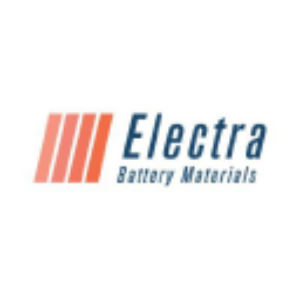Electra and Three Fires Group Advance Canada’s First Indigenous-Led Battery Recycling Venture
Rhea-AI Summary
Positive
- First Indigenous-led battery recycling initiative in Canada, promoting economic participation of First Nations in the clean energy sector
- Initial phase capacity to recycle battery scrap for up to 100,000 new electric vehicles annually
- Integration with Electra's refinery creates one of the lowest carbon footprint recycling supply chains globally
- Stable revenue model through long-term tolling agreements, reducing commodity price risk
- Strategic location planning near gigafactories in Southern Ontario to maximize operational efficiency
- Addresses critical market gap as Ontario currently lacks battery recycling capabilities
Negative
- Project still in early stages with feasibility study funding not yet secured
- Faces competition from offshore recyclers with government subsidies and deeper pockets
- Technology partners and final site location still not confirmed
News Market Reaction – ELBM
On the day this news was published, ELBM gained 0.94%, reflecting a mild positive market reaction.
Data tracked by StockTitan Argus on the day of publication.
TORONTO, June 12, 2025 (GLOBE NEWSWIRE) -- Electra Battery Materials Corporation (NASDAQ: ELBM; TSX-V: ELBM) (“Electra”) and the Three Fires Group today announced significant progress on the Aki Battery Recycling joint venture, the first Indigenous-led lithium-ion battery recycling initiative in Canada. Aki is pioneering a low emission, circular solution for managing battery waste, strengthening domestic supply chains and reducing reliance on offshore processing.
Since launching the joint venture in 2024, key milestones and strategic developments include:
- Formal establishment of Canada’s first Indigenous-led lithium-ion battery recycling venture, with Reggie George appointed as President and Andre Marais as Director of Strategy & Corporate Development.
- Shortlisting of technology partners following site visits and comprehensive due diligence on advanced battery recycling platforms.
- Ongoing engagement with government partners to secure funding for a bankable feasibility study.
- Evaluation of prospective sites, with plans to co-locate or near-locate the facility alongside lithium-ion battery manufacturers and on or near First Nations lands to maximize regional impact.
- Integration with Electra’s hydrometallurgical refinery, enabling local processing of black mass into battery-grade materials for OEMs, establishing a fully Canadian closed-loop supply chain.
Under the Aki Battery Recycling joint venture, Three Fires Group and Electra have partnered to establish a First Nations-led lithium-ion battery recycling company. Aki will process lithium-ion battery end-of-life and manufacturing scrap in a state-of-the-art pre-processing facility to produce high-grade copper, aluminum, and steel products through a battery pack and module dismantling process. The remaining material is then put through a shredding process to generate a high value intermediate product known as black mass.
Black mass contains critical minerals such as lithium, nickel, cobalt, manganese and graphite, which can be separated into saleable products through a subsequent refining process. Black mass from the pre-processing facility will be processed at Electra’s hydrometallurgical refinery north of Toronto and then returned to battery manufacturers to establish a localized closed-loop supply chain.
Reggie George has been appointed President of Aki, bringing more than a decade of experience in project management and capital raising. Mr. George is a member of Kettle and Stony Point First Nation and has an accomplished track record with startups in emerging technologies. Through his work with the Three Fires Group, Mr. George has been involved in more than C
At the heart of Aki Battery Recycling is a commitment to Indigenous economic participation in the growing battery supply chain. The joint venture reflects a shared vision to create meaningful, long-term benefits for First Nations communities while pursuing innovation to enhance the sustainability of the critical minerals supply chain.
“First Nations participation in Canada’s emerging clean energy economy is essential,” said Reggie George, President of Aki. “The Aki partnership is rooted in mutual respect, shared benefit, and environmental accountability.
“Lithium-ion battery recycling aligns with traditional values of stewardship and responsibility for the land,” George continued. “By reclaiming materials and minimizing waste, Aki embodies a regenerative model of economic growth that supports both people and planet. Through this venture, we are creating long-term opportunities, reclaiming ownership over our resources, and building an economy that is both clean and culturally grounded.”
Three Fires Group will lead capital sourcing efforts and site selection for a state-of-the-art, environmentally friendly recycling facility in Southern Ontario. Electra’s contribution includes technical and commercial expertise as well as a refining solution to ensure that critical minerals from recycled batteries remain in the domestic supply chain. Aki’s pre-processing facility is designed for scalability and replication, with plans to expand operations in step with the growing demand for lithium-ion battery recycling.
In its initial phase, the proposed facility will recycle enough lithium-ion battery scrap to supply up to 100,000 new electric vehicles each year.
“Ontario currently has no battery recycling capabilities, even as projections show the province could generate up to 30,000 tonnes of battery scrap annually by 2030,” said Andre Marais, Director of Strategy & Corporate Development. “By aligning recycling capacity growth with gigafactory expansion, Aki addresses a critical supply chain gap and positions Ontario as a leader in the responsible recovery of battery materials essential to the energy transition.”
Aki has established a shortlist of technology partners aligned with a commitment to low-emissions processing and high-quality black mass production. Site selection is also advancing, with a focus on a limited number of locations in Southern Ontario near emerging gigafactories, maximizing proximity to key customers and economic benefits for surrounding communities.
Building on the joint venture’s initial scoping study, Aki is now engaged in discussions with government partners to secure funding for a bankable feasibility study on the pre-processing facility. The project is well-aligned with several Canadian funding streams, including regional economic development programs and Indigenous loan guarantee programs at both the federal and provincial levels, many of which prioritize clean technology and Indigenous-led infrastructure.
Electra’s hydrometallurgical refinery north of Toronto will process black mass produced by Aki, which is anticipated to result in one of the lowest carbon footprint recycling supply chains in the world. The black mass will be treated using Electra’s proprietary process to recover critical minerals that can be reintroduced into the battery supply chain.
“The integration of Aki’s upstream black mass production with Electra’s downstream hydrometallurgical refining creates a vertically aligned, closed-loop system optimized for efficiency, traceability, and material recovery,” commented Dr. George Puvvada, Technology Adviser to Aki Battery Recycling. “This alignment ensures feedstock consistency and process compatibility, enabling the higher recoveries of battery-grade materials that meet OEM specifications for reintegration into North American cell production.”
Unlike most other North American pre-processing facilities, Aki will operate predominantly on a tolling fee basis through long-term contracts. This creates a strong alignment of interests with battery manufacturers and ensures that Aki achieves a consistent return, independent of commodity prices.
“The current bidding model for battery scrap widely used in North America is unsustainable,” said Michael Insulan, Vice President, Commercial, at Electra. “Offshore recyclers backed by deep pockets and government subsidies can outbid domestic players, undermining competition and market efficiency. In contrast, long-term tolling agreements offer a more stable and scalable alternative, providing predictability in feedstock volume and composition, and enabling greater operational efficiency over time.”
Currently, it is estimated that the vast majority of black mass produced in North America is exported to China, directly or indirectly, where it is processed into battery-grade materials for Asian supply chains. The circular relationship between Aki and Electra will strengthen Canada’s capacity to retain and reuse critical minerals, supporting domestic industrial growth. This is not only aligned with stated Canadian economic growth policies but also serves to reduce carbon emissions related to the transportation of materials to and from Asia.
“The Aki venture has rapidly advanced from vision to execution,” Reggie George concluded. “We are building something that addresses both economic and environmental imperatives, while also putting Indigenous leadership at the center of the clean energy transition.”
About Aki Battery Recycling
Aki Battery Recycling, a joint venture between the Three Fires Group and Electra Battery Materials, is dedicated to advancing lithium-ion battery scrap and waste recycling in North America. Located in Southwestern Ontario, on the treaty territory of the Confederacy of the Three Fires, we are leveraging our partners' expertise to create sustainable solutions that recover valuable materials from end-of-life batteries and scrap. Aki will shred batteries and scrap at a pre-treatment facility, producing a mix of materials including black mass rich in lithium, nickel, cobalt, and other critical minerals. This black mass can then be sold to Electra for further processing into valuable products for the EV battery supply chain. Aki Battery Recycling is committed to driving the circular economy and fostering a cleaner, greener future. To learn more, visit www.akirecycling.com.
About the Three Fires Group
The Three Fires Group is focused on generating wealth and prosperity from economic and infrastructure opportunities for current and future generations. Through its Climate Action Investment Policy, the Three Fires Group supports First Nation investments in non-fossil fuel, clean energy projects generally aligned with the government of Ontario's energy supply acquisition strategy, inclusive of "behind-the-meter" generation and storage.
The Three Fires Group provided technical and investment assistance for the recently announced Three Fires Nations-Ontario Southwestern Ontario Infrastructure and Economic Opportunities Table - a joint Crown-Indigenous effort to develop clean energy infrastructure in Southern Ontario, including investments to build Ontario's first large-scale electric vehicle battery manufacturing plants, five new regional transmission lines, and a forthcoming fleet of battery energy storage systems. For more information about the Three Fires Group, please visit: www.threefires.com.
About Electra Battery Materials
Electra is a leader in advancing North America’s critical minerals supply chain for lithium-ion batteries. Currently focused on developing North America’s only cobalt sulfate refinery, Electra is executing a phased strategy to onshore critical minerals refining and reduce reliance on foreign supply chains. In addition to establishing the cobalt sulfate refinery, Electra’s strategy includes nickel refining and battery recycling. Growth projects include integrating black mass recycling at its existing refining complex, evaluating opportunities for cobalt production in Bécancour, Quebec, and exploring nickel sulfate production potential in North America. For more information, please visit www.ElectraBMC.com.
Contacts
Andre Marais
Director, Strategy & Corporate Development
Aki Battery Recycling
amarais@akirecycling.com
Reggie George, President, Aki
Executive Director, Special Projects and Partnerships
Three Fires Group
Reggie.George@threefires.com
1.226.349.5499
Heather Smiles
Vice President, Investor Relations & Corporate Development
Electra Battery Materials
Info@ElectraBMC.com
1.416.900.3891
Neither the TSX Venture Exchange nor its Regulation Services Provider (as that term is defined in policies of the TSX Venture Exchange) accepts responsibility for the adequacy or accuracy of this release.
Cautionary Note Regarding Forward-Looking Statements
This news release may contain forward-looking statements and forward-looking information (together, “forward-looking statements”) within the meaning of applicable securities laws and the United States Private Securities Litigation Reform Act of 1995. All statements, other than statements of historical facts, are forward-looking statements. Generally, forward-looking statements can be identified by the use of terminology such as “plans”, “expects”, “estimates”, “intends”, “anticipates”, “believes” or variations of such words, or statements that certain actions, events or results “may”, “could”, “would”, “might”, “occur” or “be achieved”. Forward-looking statements are based on certain assumptions, and involve risks, uncertainties and other factors that could cause actual results, performance, and opportunities to differ materially from those implied by such forward-looking statements. Among the bases for assumptions with respect to the potential for additional government funding are discussions and indications of support from government actors based on certain milestones being achieved. Factors that could cause actual results to differ materially from these forward-looking statements are set forth in the management discussion and analysis and other disclosures of risk factors for Electra Battery Materials Corporation, filed on SEDAR+ at www.sedarplus.com and on EDGAR at www.sec.gov. Other factors that could lead actual results to differ materially include changes with respect to government or investor expectations or actions as compared to communicated intentions, and general macroeconomic and other trends that can affect levels of government or private investment. Although the Company believes that the information and assumptions used in preparing the forward-looking statements are reasonable, undue reliance should not be placed on these statements, which only apply as of the date of this news release, and no assurance can be given that such events will occur in the disclosed times frames or at all. Except where required by applicable law, the Company disclaims any intention or obligation to update or revise any forward-looking statement, whether as a result of new information, future events or otherwise.








